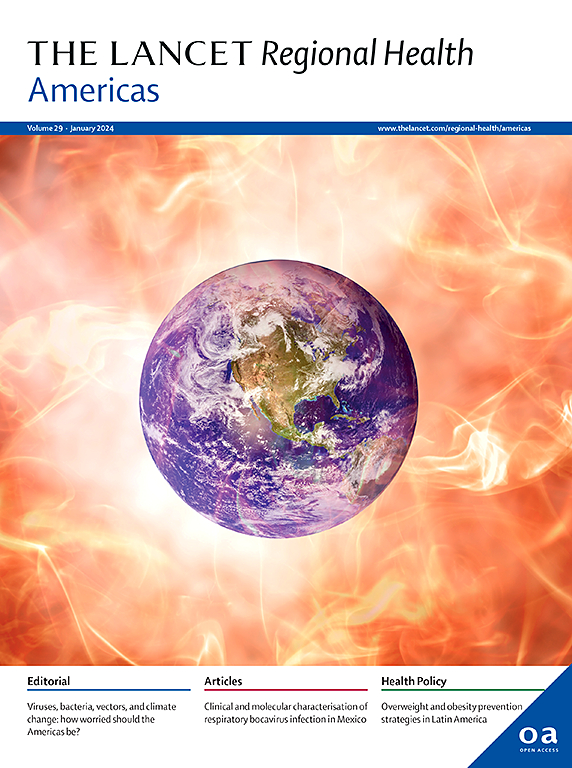Burden of infant group B Streptococcus disease and impact of maternal screening and antibiotic prophylaxis in Ontario, Canada: a population-based cohort study
IF 7
Q1 HEALTH CARE SCIENCES & SERVICES
引用次数: 0
Abstract
Background
Group B Streptococcus (GBS) significantly contributes to neonatal sepsis and meningitis, with varying disease rates reported globally and limited population-based data. We estimated infant GBS disease burden in Ontario, Canada and assessed the association of maternal GBS screening (35–37 weeks' gestation) and intrapartum antibiotic prophylaxis (IAP) provision with infant disease rates.
Methods
Our population-based cohort study included pregnant individuals and their offspring from April 2012 to March 2018, utilising the provincial birth registry linked to health administrative data. GBS cases were ascertained through culture results and diagnostic codes. We calculated incidence rates for early-onset disease (EOD: 0–6 days), late-onset disease (LOD: 7–89 days), and ultra-LOD (ULOD: 90–365 days). Adjusted incidence rate ratios (aIRR) were derived via log-binomial regression to compare infant GBS rates according to screening and IAP-receipt.
Findings
Among 776,148 liveborn infants, we identified 803 with GBS, with multiples exhibiting a threefold incidence increase. Incidence rates of EOD, LOD and ULOD were 0.49, 0.46 and 0.07 per 1000 livebirths, respectively. Of eligible pregnancies, 94% were screened; 23% screened positive, and 81% of them received IAP. Nearly 12% of term EOD infants had mothers who missed IAP despite screening positive. Maternal screening was associated with lower rates of any infant GBS disease (aIRR: 0.60; 95% CI: 0.45, 0.80). Among screen-positive births, IAP-receipt was associated with reduced rates of EOD (aIRR: 0.72, 95% CI: 0.48, 1.29) and LOD/ULOD (aIRR: 0.69; 95% CI: 0.46, 1.05), but confidence intervals included 1.0.
Interpretation
Our study, the largest Canadian investigation into infant GBS disease, highlights both widespread adoption and ongoing challenges of the current prevention strategy.
Funding
Canadian Institutes of Health Research.
加拿大安大略省婴儿 B 群链球菌疾病负担及产妇筛查和抗生素预防的影响:基于人群的队列研究
背景B群链球菌(GBS)是新生儿败血症和脑膜炎的重要致病菌,全球报告的发病率各不相同,基于人群的数据也很有限。我们估算了加拿大安大略省的婴儿 GBS 疾病负担,并评估了孕产妇 GBS 筛查(妊娠 35-37 周)和产前抗生素预防(IAP)与婴儿患病率的关系。通过培养结果和诊断代码确定了 GBS 病例。我们计算了早发症(EOD:0-6 天)、晚发症(LOD:7-89 天)和超晚发症(ULOD:90-365 天)的发病率。通过对数二项式回归得出调整后的发病率比 (aIRR),以比较筛查和接受 IAP 的婴儿 GBS 发病率。EOD、LOD 和 ULOD 的发病率分别为每 1000 例活产 0.49、0.46 和 0.07。在符合条件的孕妇中,94%接受了筛查;23%筛查结果呈阳性,其中81%接受了IAP。尽管筛查结果呈阳性,但近 12% 的足月排卵期婴儿的母亲错过了 IAP。母体筛查与较低的婴儿 GBS 患病率相关(aIRR:0.60;95% CI:0.45,0.80)。在筛查呈阳性的新生儿中,接受 IAP 与 EOD(aIRR:0.72;95% CI:0.48;1.29)和 LOD/ULOD (aIRR:0.69;95% CI:0.46;1.05)发病率的降低有关,但置信区间包括 1.0。
本文章由计算机程序翻译,如有差异,请以英文原文为准。
求助全文
约1分钟内获得全文
求助全文
来源期刊

Lancet Regional Health-Americas
Multiple-
CiteScore
8.00
自引率
0.00%
发文量
0
期刊介绍:
The Lancet Regional Health – Americas, an open-access journal, contributes to The Lancet's global initiative by focusing on health-care quality and access in the Americas. It aims to advance clinical practice and health policy in the region, promoting better health outcomes. The journal publishes high-quality original research advocating change or shedding light on clinical practice and health policy. It welcomes submissions on various regional health topics, including infectious diseases, non-communicable diseases, child and adolescent health, maternal and reproductive health, emergency care, health policy, and health equity.
 求助内容:
求助内容: 应助结果提醒方式:
应助结果提醒方式:


